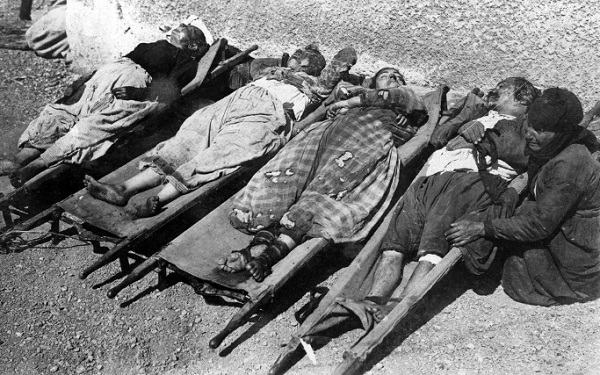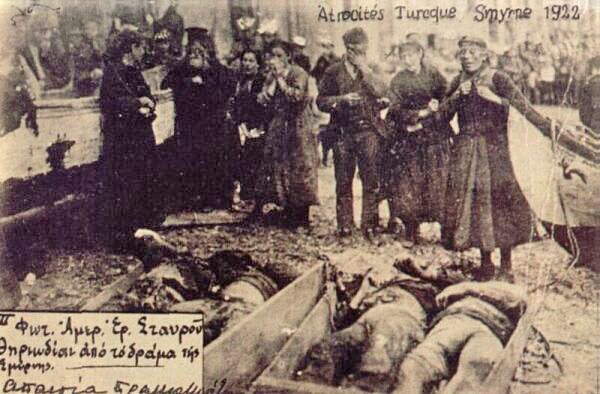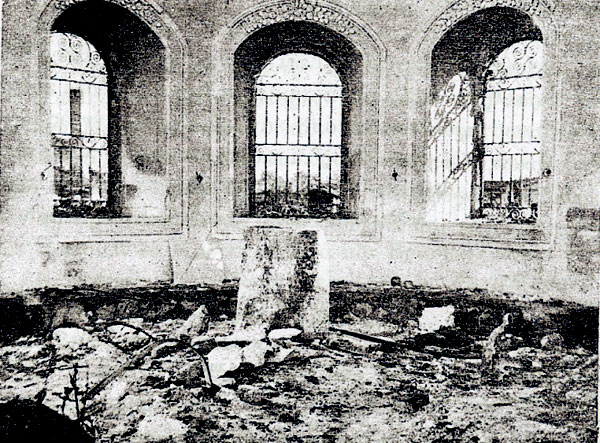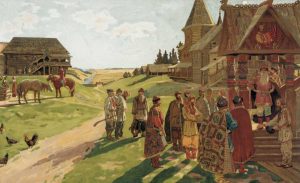
Views: 2564
The Greek Genocide (or Ottoman Greek Genocide) refers to the systematic extermination of the native Greek subjects of the Ottoman Empire before, during and after World War I (1914-1923). It was instigated by successive governments of the Ottoman Empire; the Committee of Union and Progress Party (C.U.P), and the Turkish Nationalist Movement of Mustafa Kemal Atatürk. It included massacres, forced deportations and death marches, summary expulsions, boycotts, rape, forced conversion to Islam, conscription into labor battalions, arbitrary executions, and destruction of Christian Orthodox cultural, historical and religious monuments. According to various sources, approximately 1 million Ottoman Greeks perished during this period.
The first phase of the Greek Genocide commenced in the Spring of 1914 in Eastern Thrace and western Anatolia when Turks were ordered to boycott Greek businesses. Hundreds of thousands of Greeks from these regions were also deported during this period. With the outbreak of the Great War in July of 1914, all Ottoman Greek men aged between 21-45 years were conscripted into forced labor (or concentration) camps. Most of these men were to perish under appalling conditions after being forced to work around the clock with little food or water. These camps also served as a means to break up and disarm Greek communities, thus bringing about their eventual destruction.
In 1915, under the guidance of German military personnel, the C.U.P ordered the deportation of Greek communities in the Dardanelles and Gallipolli region under the pretext of military necessity. These Greeks were not permitted to take anything with them. Goods in their shops were later sold by Ottoman authorities. Entire communities living along the western coastline of Asia Minor were deported to the interior or to Muslim villages where they were forced to choose between Islam or death. Homes in villages that were not burnt were seized by free-booters of neighboring communities. In some instances, Greeks were forced to sign declarations saying they were leaving of their own free will. In most cases, before deportations took place, Ottoman gendarmes (police) and çetes (armed irregulars) seized money and valuables from communities, committed massacres and burnt churches and schools. In the region of Pontus, Greek communities were deported during the peak of winter when fatalities could be at their highest. Stories of lethal injections, bodies being towed out to sea and dumped, as well as mass killings of Greeks in churches was also witnessed.
According to the Chairman of the Greek Relief Committee Frank W. Jackson, by 1917 some 700,000-800,000 Greeks were deported mainly from the coastal regions to the interior of Turkey. The death toll from these deportations was high. With the Ottoman Empire’s defeat in WW1, prominent leaders of the C.U.P Party were given death sentences during Ottoman Courts-Martial for their role in organizing the massacre of Greeks, Armenians and Assyrians during the war. But the post-war formation of the Turkish Nationalist movement under the leadership of Mustafa Kemal Atatürk interrupted the proceedings to bring the perpetrators to justice. Instead, the Kemalist Nationalists continued the C.U.P policy of massacring and deporting Greeks, and resulted in the burning of the city of Smyrna (today Izmir) to the ground and the expulsion of all remaining Greeks from Turkey. All able-bodied Greek males were refused exit from Turkey and were sent to the interior where most perished in slave labor camps or were massacred.
Remembrance:
The following are the days of remembrance for the Greek Genocide. Greeks have preferred to remember the genocide based on region: September 14 (Asia Minor as a whole), May 19 (Pontus region) and April 6 (Eastern Thrace).
Source: Greek Genocide Resource Center
Origins of images: Facebook, Twitter, Wikimedia, Wikipedia, Flickr, Google, Imageinjection & Pinterest.
Read our Disclaimer/Legal Statement!
Donate to Support Us
We would like to ask you to consider a small donation to help our team keep working. We accept no advertising and rely only on you, our readers, to keep us digging the truth on history, global politics, and international relations.
FOLLOW US ON OUR SOCIAL PLATFORMS










